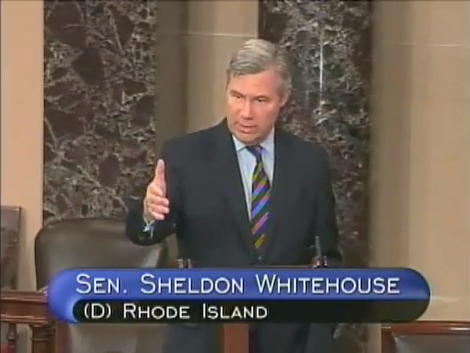Whitehouse slams second IRS "scandal"
 |
| Sen. Sheldon Whitehouse floor speech. |
In a Senate floor speech this afternoon, Sen. Sheldon Whitehouse (D-RI) criticized the IRS for targeting conservative nonprofit groups for extra scrutiny, but also called on his colleagues to pay attention to a second, less visible "scandal" of tax-exempt organizations filing false statements "with impunity."
In the first scandal, the Treasury Inspector General report found the IRS unit tasked with evaluating applications for 501(c)4 tax-exempt status improperly targeted groups with names like "tea party." While the IG's report specifically notes that only "first-line management" in a Cincinnati office were responsible for developing the screening criteria, late today, the fallout cost the acting IRS Commissioner his job.
But that's not what brought Whitehouse to the floor today. In a 14-minute speech (YouTube, text), the senator chided both the IRS and the Department of Justice for failing to adequately enforce rules governing activities permitted tax-exempt social welfare groups under 501(c)4 status.
Part of the problem, Whitehouse said, lies with the IRS, who "decided that an organization is organized 'exclusively' for the promotion of social welfare if it is 'primarily' engaged in social welfare activities, that 'primarily' means 51%, and that the other 49% can be purely political." That slim majority, Whitehouse said, often comprises "educational" or "legislative" activities "that are really just the same political ads given another name."
Making it even worse — and what clearly got under this former prosecutor's skin — is that these same organizations sometimes filed conflicting reports with the Federal Elections Commission.
Citing data from ProPublica, the Pulitzer-winning nonpartisan investigative news site, Whitehouse noted that in almost a third of the cases reviewed, there were discrepancies. "[ProPublica] looked at 104 organizations that had reported electioneering activity to the Federal Election Commission or state equivalents, saying 'here is what we spent on elections.' ProPublica cross-checked; 32 of them had told the IRS they spent no money to influence elections, either directly or indirectly. Both statements cannot be true."
One group, he said, "declared to the IRS it had spent $5 million on political activities, but told the FEC it had spent $19 million on political ads. Another pledged its political spending would be 'limited in amount and will not constitute the organization's primary purpose,' and then went out and spent $70 million on ads and robocalls in one election season."
"Making a material false statement to a federal agency is not just bad behavior, it's a crime," said Whitehouse. "It is a statutory offense under 18 U.S. Code Section 1001."
However, said Whitehouse, unless the IRS specifically refers a case to the Department of Justice, there's no attempt to hold groups accountable. And those referrals, he said, just aren't happening. "Apparently, no matter how flagrant the false statement, no matter how great the discrepancy between the statements filed at the IRS and the statements filed at the election agencies, no matter how baldly the organization in practice contradicts how it answered IRS questions about political activity, the IRS never makes a referral to the Department of Justice."
"Right now, organizations lie with impunity, and in large numbers," said Whitehouse.